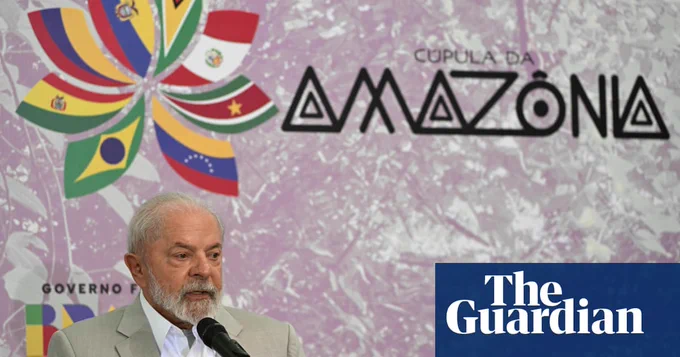
The Brazilian president, Luiz Inácio Lula da Silva, has told developed countries to put their money where their mouth is when it comes to protecting the world’s remaining tropical forests, as major rainforest nations demanded hundreds of billions of dollars of climate financing and a greater role in how those resources are spent.
“It’s not Brazil that needs money. It’s not Colombia that needs money. It’s not Venezuela. It’s nature,” Lula told journalists on the second day of a major environmental summit in the Amazon city of Belém.
For two centuries, industrialized nations filled the world’s atmosphere with pollution, Lula declared, “and they now need to pay their bit to restore part of that which was wrecked”.
“It’s nature that needs money. It’s nature that needs financing,” added the 77-year-old leftist.
Lula’s appeal came after hours of meetings between the leaders of the Amazon’s eight nations and representatives of fellow rainforest nations, the Republic of the Congo, the Democratic Republic of Congo (DRC) and Indonesia. Brazil, Indonesia and the DRC are home to 52% of the world’s remaining primary tropical forests, vast carbon sinks which play a critical role in efforts to control climate change.
In a declaration entitled “United For Our Forests”, the governments of those countries reaffirmed their commitment to reducing deforestation and finding ways to reconcile economic prosperity with environmental protection. They also voiced concern at the developed world’s failure to meet mitigation targets and fulfill a pledge to provide $100bn a year in climate financing, calling for that to rise to $200bn by 2030.
Lula said the fledgling rainforest bloc had a simple message to those “rich countries” in the lead up to November’s Cop28 summit in Dubai: “If they want to effectively preserve what is left of the forests, they must spend money – not just to take care of the canopy of the trees but to take care of the people who live beneath that canopy and who want to work, to study and to eat and … to live decently.”
“It’s by taking care of these people that we will take care of the forest,” Lula added.
The declaration came on the second and final day of Lula’s Amazon summit, part of efforts to reposition Brazil as a political and environmental heavyweight on the world stage.
On Tuesday, the eight Amazon countries belonging to the Amazon Cooperation Treaty Organization (Acto) published a communique vowing to unite to prevent the rainforest region being commandeered by criminal groups or reaching a catastrophic point of no return after which the forest would die off.
Activists called that declaration a significant first step in joint efforts to fight the climate crisis but voiced frustration at its failure to mention the phasing out of fossil fuel exploration in the Amazon or include a common commitment to halting deforestation by 2030.
“Blame it on Bolivia,” one Brazilian official said of Acto’s failure to agree on a specific deforestation target.
Another official told the Financial Times: “We tried [to include some deforestation targets], but Bolivia explicitly asked for it to be deleted.”
Deforestation is currently soaring in the Bolivian Amazon, which represents about 8.4% of South America’s largest biome. In Brazil, which controls about 60% of the Amazon, the trend is more positive. Deforestation has fallen 42.5% in the first seven months of Lula’s government, after four years in which destruction soared under the far-right populist Jair Bolsonaro.
Addressing reporters, Lula said his government was serious about what he called the “severe escalation of the climate crisis”.
“Today, denying the climate crisis is nothing more than foolishness,” he said. “But valuing the forest, isn’t just about stopping trees being cut down. It means offering dignity to the nearly 50 million people who live in the Amazon.”
Before Lula took power, Brazil signed a cooperation agreement with Indonesia and the Democratic Republic of Congo to work together on rainforest conservation at UN climate and biodiversity Cops through the so-called “Opec for rainforests”. The three countries, home to about half of the world’s tropical rainforest into the Amazon, Congo basin and Borneo and Sumatra, agreed to work together in talks around carbon markets and finance for conservation.
Many rainforest countries want financial support from industrialised countries to conserve their forests, which are critical to meeting the goals of the Paris agreement, arguing that they are giving up opportunities to develop their economies. But markets where forest commodities are consumed, such as the EU, have preferred to establish bans on deforestation-linked commodities.
At the UN biodiversity conference Cop15 in December where countries agreed to protect a third of the planet for nature, the DRC was one of the few countries that objected to the final agreement by demanding more money from the global north, prompting frantic behind the scenes negotiations which were only resolved after interventions by Brazil and Indonesia.
In Belém, Lula also vowed to uproot the criminal enterprises that tightened their grip on the Amazon while his climate-denying, pro-development predecessor dismantled environmental and Indigenous protections.
“We’re going to really fight to expel the narco-traffickers and gun-runners and organized crime from the forests of this country,” Lula said, as federal police announced they had destroyed dozens of gold-mining dredges in the remote jungle region where British journalist Dom Phillips was murdered last year with the Indigenous expert Bruno Pereira.
Fuente: The Guardian


